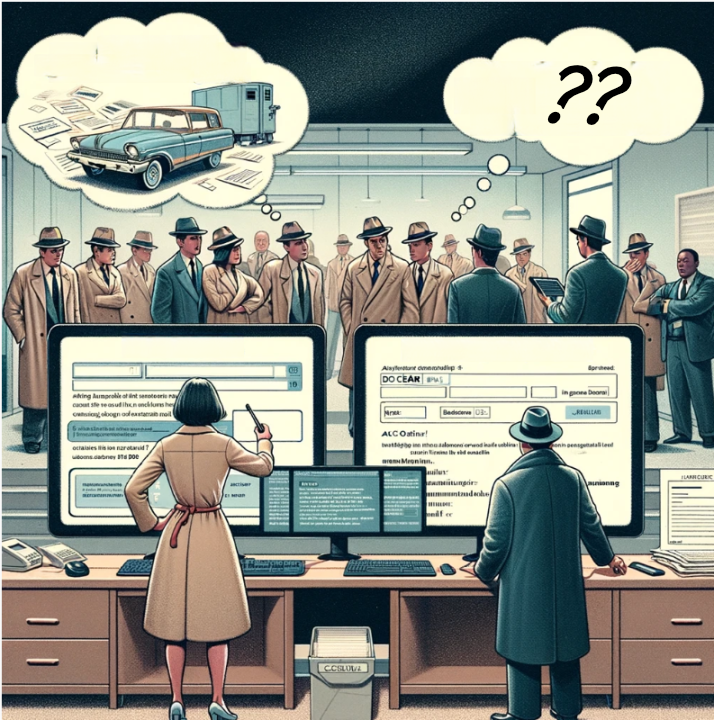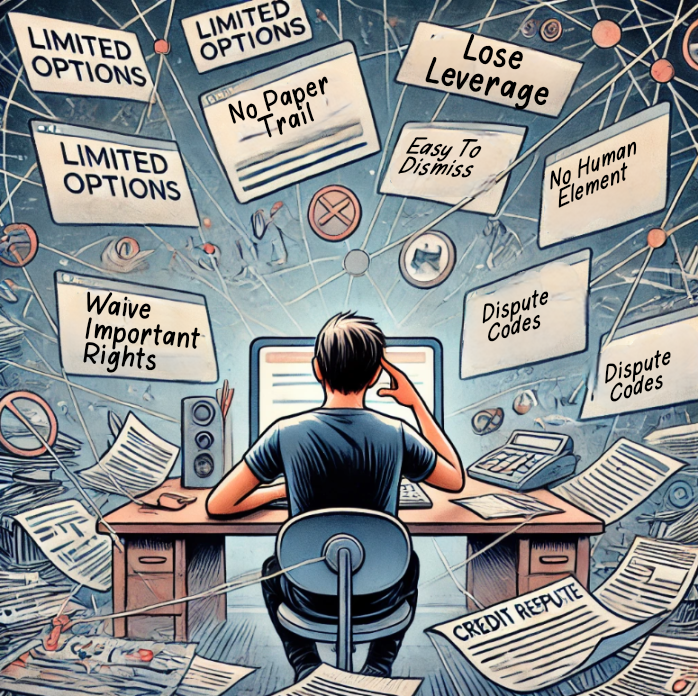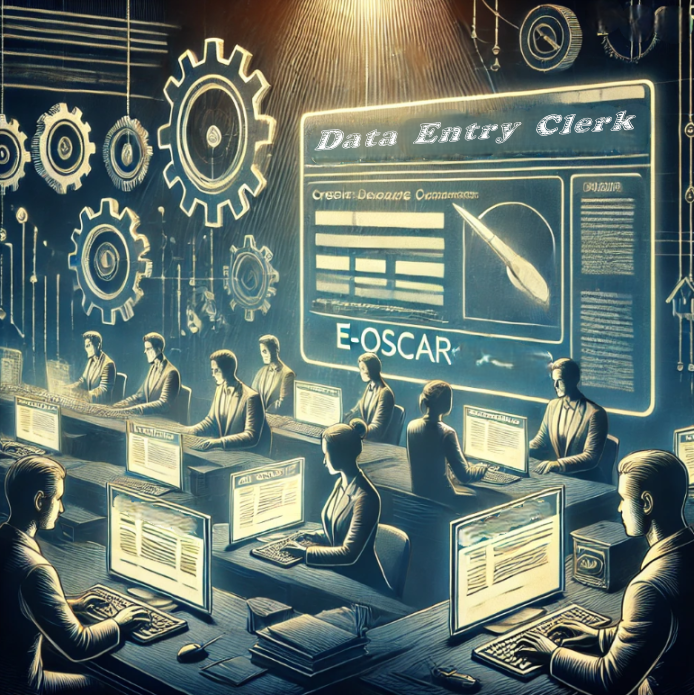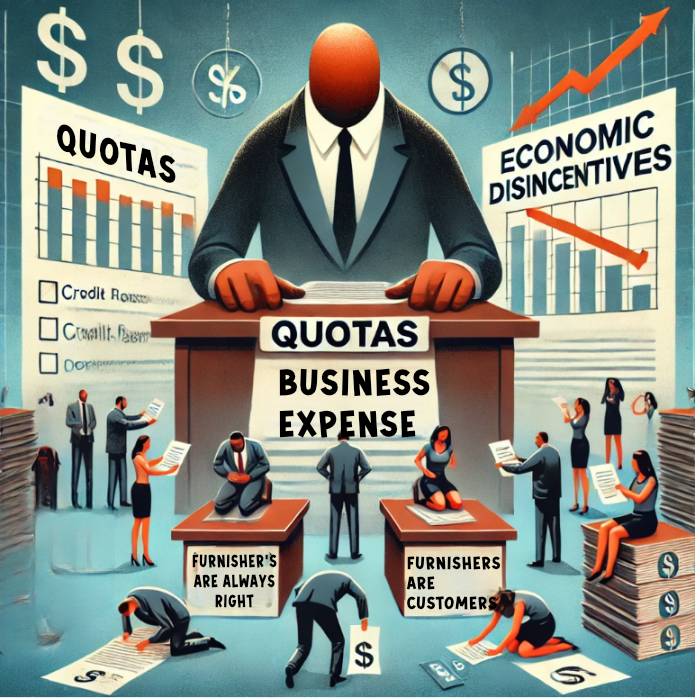E OSCAR System How Does It Function
The majority of the links on our website are affiliate links. This means that if you click on the link and make a purchase, we earn a small commission at no additional cost to you.
E OSCAR (Online Solution for Complete and Accurate Reporting)

How An Investigation is conducted
What do you think of when you hear or see the word “investigation”? Probably somewhere along the lines of document review, fact research, interviews with both parties, and handwriting comparison. Here is an example, these are some of the duties a fraud investigator would perform for Zales Jewelers:
- Securing original documents, such as the credit application, sales slips, and any written accounts from store staff.
- Obtaining copies of identification documents and police reports.
- Analyzing the signatures on the sales slip and the credit application.
- Conducting interviews with store employees, including the manager and the sales associate involved in the transaction.
- Drafting statements for store employees to endorse or recording notes during interviews.
- Questioning the fraud victim to collect more details that may aid in identifying a suspect or understanding the nature of the fraud or forgery.
That sounds about right. How much do you think this investigation would cost Zales Jewelers? How long do you think it would take to complete the investigation? Keep those two questions in mind. Now you probably do not want to know what you’re going to read. But even though it sounds like bad news, you can use this information to your advantage.
The E-OSCAR system, was created, designed and deployed by the credit bureaus. It summarizes detailed dispute letters into dispute codes. This highly automated and computer-driven process uses an electronic form called an Automated Consumer Dispute Verification (ACDV) form. This is the only form of communication between the credit bureaus and the furnishers.
Key Points of the e-OSCAR Process:
- Automated Dispute Forms: The ACDV form, streamlines the dispute into one- or two-digit codes that represents the consumer’s detailed concerns.
- Limited Interaction: Initiated through an online system, e-OSCAR diminishes the human element in processing disputes. At first there were 100 codes that were available to choose from. Today the number of available options is 26 and E-OSCAR is heavily dependent on the dispute codes to categorize and communicate issues.
- Loss of Supporting Documents: Supporting documentation, like billing statements and letters from consumers, which provide substantial proof of disputes, are not passed along when the codes are sent to furnishers.
- Codes Usage: Three of the twenty-six dispute codes are used for majority of disputes. The details of each individual dispute are not addressed. With such a complex system, three dispute codes cannot cover the spectrum of issues that consumers have.
Disadvantages Highlighted:
- Inadequate Responses: Following a quick investigation with a minimum effort, consumers receive generic responses from the credit bureaus that are meaningless. They lack details, justification, and explanation of the findings. They are not required to provide written explanation of their investigations. It is only when the consumer requests written details of their findings is when they are required to provide written explanation.
- Limited Categorization and Generic Notices: Examples from court cases reveal how responses from the bureaus fail to address specific consumer disputes. The results are generic notifications that do not resolve or appropriately acknowledge the issues raised by the consumers.
You need to understand the rights that consumers have. Under the Fair Credit Reporting Act (FCRA), you have certain automatic rights, but many key protections only kick in if you actively pursue them. Here’s a breakdown:
Automatic Rights:
- Dispute Process: If you challenge an error on your credit report, the credit agency must investigate it within 30 days.
- Notification of Adverse Actions: If a decision negatively affects you (like being denied a loan or job) based on your credit report, you’ll automatically be notified, including who provided the report.
- Reinsertion Notice: If something that was removed from your report gets put back, the agency must inform you within five days.
Rights that Require Your Action:
- Seeing Your Credit Report: You must request a copy to see the outcome of a dispute or the current state of your report.
- Verification Requests: If you need more details about specific items on your report, you must ask for this in “writing”.
- Free Credit Reports: After a fraud alert, you must ask for your free reports; they aren’t sent automatically. You’re entitled to one free report per year from each major agency, but you need to request additional ones.
- Adding a Statement of Dispute: If you’re not happy with how a dispute was resolved, you must ask to add a statement to your file.
What You Could Lose by Not Acting:
- Not Disputing Errors: If you don’t challenge errors, they won’t be corrected, which could keep harming your credit.
- Ignoring Notifications: Not following up on adverse actions or reinserted items could mean missing chances to correct them.
- Not Requesting Detailed Information: Failing to ask for verification or details about disputes could leave you without essential info needed to challenge inaccuracies.
In short, while the law gives you some automatic protections, you need to be proactive to make the most of your rights under the FCRA. Not taking action can lead to missed opportunities to fix issues on your credit report.
Online Credit Disputing: A Cautionary Guide

E OSCAR system revolves around the standardized dispute codes. The only reason E OSCAR was created, was to eliminate disputes as fast as possible. Because the credit bureaus receive thousands of dispute letters daily. They cannot possibly address them all. However, the FCRA legally requires the credit bureaus to investigate all disputes. Some letters are lost, ignored, and mishandled. The high volume of disputes overwhelms the system and staff. Here is the catch, the credit bureaus claim that their careless investigations under the FCRA is because of frivolous disputes from credit repair organizations. Who make guarantees to consumers to be able to delete accurate negative information from credit files. Only 30% of disputes at credit bureaus are linked to such cases so that claim doesn’t hold any weight.
The Economics of Credit Reporting
A. Identifying the Customer
Do not think that the credit bureaus are looking out for consumers’ best interest. They are a business, and their main clients are the creditors. Creditors have access to their databases and use the data to market financial products to very targeted consumers. That is why a creditor decides to report their information to the credit bureau. The credit bureaus have reporting fees. They generate revenue in other ways, for instance, credit monitoring services. But the furnishers is where they generate more revenue.
Consumers unfortunately, are caught up in the mix of the relationship between the creditor and the credit bureaus. Consumers have no say so about the data about them, being in their databases. We cannot have them remove the data from their databases and for the majority of Americans, establishing a credit history is essential for significant life events. The purchasing of a house, funding an education, or purchasing an automobile. The data in their databases about consumers will impact many other areas of life. We, consumers cannot walk away with the information if we do not like how the information on us is being handled. The creditor owns the information.
The creditor, on the other hand, can take their business elsewhere. So, if a creditor only reports to Experian and their credit dispute investigations are thorough like Zales fraud investigations and the outcome results in favor of the consumer. Experian will ruin their customers’ ability to collect. Ultimately losing profits for their customer and driving them away. If it comes down to siding with the furnisher or siding with the consumer, who do you think the credit bureau is going to side with?
Credit disputes are also costly. Whatever the cost of a Zales fraud investigation is, multiply that by 1000. The expense is going to offset any profit made. E-OSCAR system is the credit bureaus way of reducing business expenses. Do you ever wonder what the terms and conditions are, when you use online disputing? Before you open a dispute, you must agree to their terms and conditions. It’s never straightforward, but at the end of the day, the consumer agrees to waive their right to request written details of the investigation. And cannot challenge the outcome if it is not in their favor. Those are the most important rights that a consumer can exercise. There is a good chance that your online dispute will be misclassified because there isn’t any human judgement, interaction or common sense. And the credit bureaus don’t have IT techs that will dive into the systems files and correctly classify a dispute. In fact, trying to correct a misclassified dispute is perceived as gaming the system, which leads to the dispute getting flagged as frivolous. There is no paper trail and no evidence of negligence when disputing online. You want your letters to have human interaction. The credit experts only dispute through U.S. Postal Service, so we will follow their lead.
Key Concerns with Online Disputing:
- Limited Consumer Rights: Engaging in online disputes often involves accepting terms and conditions that waive crucial consumer protections. Online systems, including terms of service that users rarely read, can strip you of the right to a detailed explanation of the investigation process and allow the reinsertion of negative items with little to no recourse.
- Inefficiency and Rights Waiver: Online disputing formats like E-OSCAR, designed to streamline bureau processes, tend to oversimplify disputes into numerical codes that can misrepresent the specifics of a dispute case. This digitization lacks human judgment, potentially leading to unresolved or misclassified disputes.
- Lack of Supporting Evidence: The online format does not allow for the attachment of supporting documents, which can lead genuine disputes to be dismissed as “frivolous or irrelevant.”
Credit Scores vs. Credit Reports: The FCRA guarantees free access to your credit report once per year from each of the three major credit bureaus, but it does not cover free access to your credit scores. These are often available at a cost or through credit monitoring services.
Avoid Free Credit Score Websites: Obtaining your credit report from websites offering free credit scores will not be accurate. Numerous third-party sites are known to inflate scores, potentially leading to disappointment. They sign you up for costly credit monitoring services that will not justify the expense. They are only good for monitoring the progress of improving your credit score. Because they are not FICO scores and are always off by decent number of points.
In addition, the only credit scores that are available to the public for purchasing are consumer credit scores. Creditors use FICO’s consumer credit scoring model and credit monitoring service websites use their own scoring models that aim to produce the same results as FICO but do not. The standard for credit scoring is FICO. And their scoring models are proprietary. FICO also has industry specific scoring models that lenders use.
You do not want to rely on consumer credit scores when applying for a mortgage. There are unique aspects of mortgage lending that are taken into account when credit scores are calculated that other types of credit do not. The same goes for the automobile industry. The scoring models aren’t as lenient as the consumer credit scoring model.
This is why you want to focus on the quality of your credit report and do not focus on credit scores.
So, if you wrote a letter that stated any of the above codes. Sent it in with your forms of identification, the dispute is going to be determined as frivolous. And that is basically what is being sent to the furnisher by the investigator except the codes are in numerical form.
Among the major credit bureaus, only Experian handles consumer disputes within the United States. However, Experian doesn’t train their employees to do investigative -type duties.
TransUnion manages its disputes in its consumer relations facility near Philadelphia. The disputes are digitized and then sent to Intelenet in Mumbai, India. This subcontractor gets direct access to TransUnion’s database. The vendors can retrieve consumer credit files and work the Automated Consumer Dispute Verification (ACDV) form. The form includes the consumers personal identifiers to make sure it is the correct consumer. The vendors are required to pick the dispute code listed on the electronic form that best describes the issue and sends it to the furnisher to start an investigation.
Furnishers’ Inadequate Investigations Exacerbate System Flaws
The e-OSCAR system is completely automated unless you dispute through the U.S mail. Then your dispute is funneled into the E-OCAR system a different way. The credit bureaus dispute investigator pass along the electronic form disputes to furnishers. Generally, furnishers only confirm the existence of disputed information rather than thoroughly investigating the claims. They tend to overlook the core issues, fail to review documents, or interact with consumers. Their process involves checking that the data on the Automated Consumer Dispute Verification (ACDV) matches their records before verifying the information as accurate to the credit bureaus. This system allows furnishers to easily validate disputed information without comprehensive verification, thus continuing the pattern of inadequate dispute resolution.
Transmitting Essential Dispute Details: A Failure in the Credit Reporting Process
The Fair Credit Reporting Act (FCRA) requires credit bureaus to include “all relevant information” provided by the consumer in the dispute notice sent to furnishers. However, the e-OSCAR system doesn’t have any feature to attached any supporting documents. And failing to forward key supporting documents such as account applications and billing statements that could decisively support the consumer’s position.
Although the FTC and Federal Reserve Board acknowledge that the exclusion of actual documents can result in incorrect dispute resolutions, no measures have been implemented to revise the bureaus’ practices. The credit bureaus have added the “FCRA Relevant Information field” to the electronic form. The field holds enough characters to include a one-line sentence for any comments relevant to the dispute. But it is only used in less than 10% of cases.
The failure to adequately convey dispute details and documents significantly undermines consumers’ rights and their ability to compel furnishers to conduct thorough investigations. It provides more room for disputes to be determined as frivolous.

